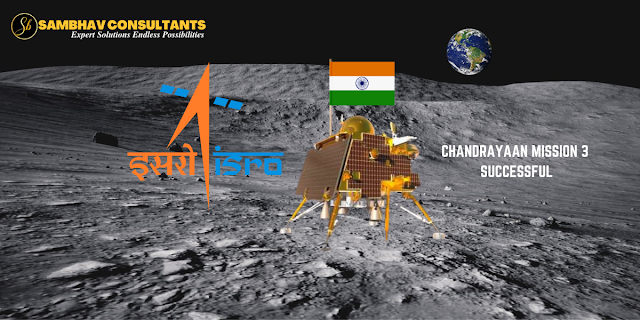Chandrayaan 3 Lands on the South Pole of the Moon: Here is a tribute to the Rocket Woman of India and Her Contribution to the Lunar Mission of the Country
Several
years ago, in 2014, the world stood witness to a spectacular photo that went
viral from the ISRO: women with flowers in their hair and dressed up in elegant
sarees were celebrating the successful launch of Mangalyaan, India’s Mars
Orbiter. It seemed rather unconventional to many people since aerospace
missions are considered a male forte. Nine years later, during the launch of
Chandrayaan 3 from the Satish Dhawan Space Centre at Sriharikota, we saw a similar picture
again. However, that one familiar face in both these pictures is none other
than India’s Rocket Woman, Ms. Ritu Karidhal Shrivastava. As India becomes the
first country to successfully land on the South Pole of the moon, it is high
time to know a little more about the contribution of the woman behind India’s
successful lunar mission.
A Little About Ritu Karidhal
Our
very own Rocket Woman was born and brought up in Lucknow a city that still
beholds the traditional Indian culture and celebrates religious sentiments. A
keen sky watcher with a dire passion for space science, she defied
all the norms of society and pursued her Masters in Physics from the University of Lucknow and
later, studied at the Indian Institute of Science in Bengaluru.
Following this, she joined the Indian Space Research Organisation (ISRO) in the
year 1997. For a long span of 26 years, Ms. Karidhal has been involved in
numerous projects at the ISRO of which the Mangalyaan and the Chandrayaan 2 are
the most remarkable ones. She bagged the Young Scientist Award, ISRO team
award, ASI team award, and other such awards for her remarkable achievements.
India on the Moon
India’s first mission to the moon dates back to 2008 when we
launched a Polar Satellite Launch Vehicle (PSLV) to orbit the moon. Although
Chandrayaan 1 successfully orbited the moon, it seemed as though we needed
more. So, in 2019. The determination and hard work of innumerable scientists
paid off: Chandrayaan 2 was successfully launched with Ritu Karidhal as the
Mission Director. Later, however, on the day of the landing, it broke our
hearts to hear ISRO chairman K. Sivan, stating that "it must have been a
hard landing". Fast forward 4 years, India has successfully landed on the
South pole of the moon, thanks to all the ISRO scientists and to our Rocket
Woman.
Role of Ritu Karidhal and
Other Female Scientists in the Success of Chandrayaan 3
It
will be no exaggeration to state that the success of Chandrayaan 3, was aptly
fuelled by the influence of Ms. Ritu Karidhal, Ms. Kalpana K and several other
female scientists who contributed to this mission directly or indirectly. A
senior official of the Indian Space Research Organisation (ISRO) informs that,
“There are about 54 female engineers/scientists who worked directly in the
Chandrayaan-3 mission”. Ms. Ritu Karidhal, was in charge of overseeing the
coordination of the orbiter, the lander, and the rover in mission Chandrayaan
2. The extensive knowledge and expertise of her coupled with her exceptional
leadership qualities ensured the success of India’s missions to the moon. Her
role in Chandrayaan 3 is as vital as ever. Her expertise in trajectory
calculations, operational strategies as well as the idea for selecting the
landing site were the real game-changers in the mission. Her mastery in the art
of navigating through the maze of complex challenges and mitigating imminent
and potential risks has contributed to not only the success of Chandrayaan 3
but also to the overall space endeavours of our country.
Chandrayaan 3: A Grand Success
Chandrayaan
3 is the most recent lunar mission by the ISRO and the success of which is
currently the most talked about issue all over the world. It aims at providing
a better understanding of the surface of the moon and its composition.
The
objectives of the Chandrayaan 3 seem to be a trailer for the bigger picture of
India’s space exploration that we are yet to witness. The mission intends to
build upon the previous Chandrayaan missions, especially the Chandrayaan 2.
This will provide us with a deep understanding of the topography, geology, and
composition of the moon. The Lander and the rover will work together to explore
certain regions on the south pole of the moon to gather data, conduct
experiments, and transmit them back to the Earth.
There
is no denying the fact that women are slowly but steadily emerging as
formidable forces in the world of space exploration in India. As we celebrate
the Rocket Woman of India, we must not forget other female scientists like
Vanitha M., the Project Director of Chandrayaan 2, Nandini Harinath, the Deputy
Operations Director of the prestigious Mars Orbiter Mission, Anuradha TK, the
Geosat Programme Director at ISRO Isro Satellite Centre and innumerable other
female scientists working at the various sectors of the ISRO. From the first
Chandrayaan launch in 2008 to the success of Chandrayaan 3, India is
undoubtedly going places.
.png)

.jpg)
%20(1000%20%C3%97%20788%20px).jpg)
Comments